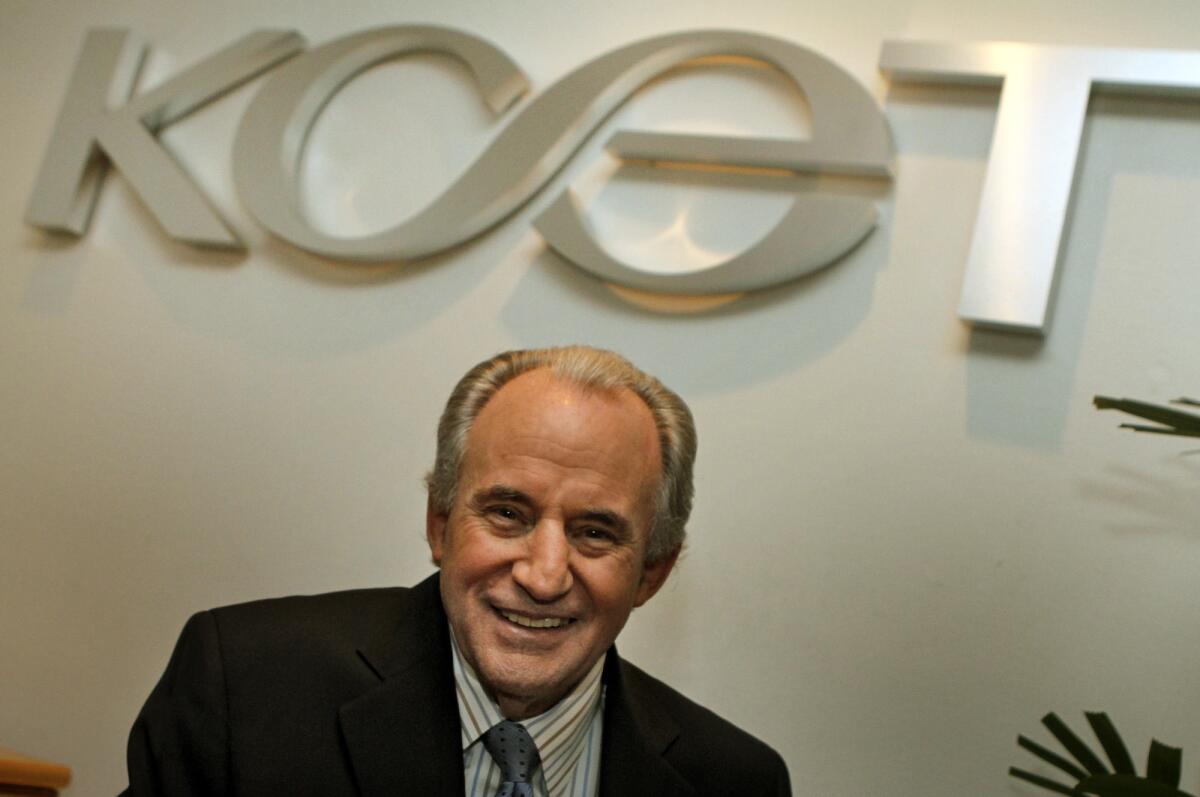KCET’s Al Jerome retiring as CEO of embattled public TV station

- Share via
KCET-TV will have to navigate the storm it now faces without its longtime captain.
Al Jerome, who has run the troubled public TV outlet for the last 18 years, announced Tuesday that he would be stepping down from the organization, even as mounting financial woes threaten to overwhelm it.
Jerome, 71, said he plans to retire in the next six months while he helps Burbank-based KCETLink, which now runs the station, find a new chief executive.
KCET left the PBS network in late 2010 after a dispute over dues and other issues. Since then, the station has struggled to find its place as the nation’s largest independent public broadcast TV station.
PHOTOS: Faces to watch 2014 | TV
A financial audit released earlier this year raised “substantial doubt” about KCET’s ability to stay in business long term. The organization lost $12.5 million during the fiscal year that ended June 30, the audit said. The previous year saw millions in losses as well.
“It’s been a privilege to lead this organization during its PBS years and into an entrepreneurial era,” Jerome said in a statement. “As we begin preparations for KCET’s 50th anniversary, and continue to chart a new course for the organization, I feel that this is the appropriate time to bring in a new CEO.”
Through a spokeswoman, Jerome declined an interview request.
But he leaves behind a mixed record at KCET, media experts say.
“It’s hard to say what his legacy is going to be, because the survival of the station is still an open question,” said Ruben Martinez, a former host of KCET’s public-affairs show “Life & Times” and an English professor at Loyola Marymount University.
Martinez praised Jerome for bringing in a new generation of writers and producers, including Juan Devis, KCET’s director of program development and production. Devis has helped spearhead “Artbound,” the station’s acclaimed cultural initiative consisting of multimedia programming.
BEST TV OF 2013 Lloyd | McNamara
On the other hand, KCET “still seems to be withering in terms of old-school broadcast, but maybe that’s not a bad thing,” Martinez added. “The real dynamism of the station is online.”
Marty Kaplan, a professor at the USC Annenberg School for Communication & Journalism, said that Jerome had good ideas to expand programming but that he often was unable to secure funds to pay for them.
“It’s tough to be innovative without resources,” Kaplan said. “Crowd-sourcing and other digital strategies make sense ... but real journalism takes real money. The board, and whoever takes Al’s place, will need a strong, clear sense of KCET’s mission going forward — its niche and uniqueness.”
The station has undergone some tough times lately. To help downsize its operating costs, KCET sold its landmark studio to the Church of Scientology in 2011 and relocated to a Burbank high-rise.
The station also merged with San Francisco-based satellite network Link Media. Dozens of layoffs followed the merger.
TV PREVIEW: Full coverage of the season’s shows
One embarrassment came in 2011, when the station trumpeted a $50-million programming deal with a French-born TV executive named Dominique Bigle. Despite the fanfare, the partnership yielded just one low-profile series, “Classic Cool Theater.”
KCET’s next steps may decide its ultimate fate. The board — now chaired by former Walt Disney Studios Chairman Dick Cook — is seeking a chief executive who can right the station’s finances while expanding its programming, which will be no small task.
“The board is committed to identifying a new leader who can leverage the positive momentum that Al has created to establish a sustainable model for public media that engages a new generation,” Cook wrote in a statement.
One option apparently not on the table: a remarriage with PBS, which is riding high with the British period soap “Downton Abbey.” Any such return to the fold would be complicated because of PBS SoCaL, the former KOCE-TV, which became Southern California’s preeminent PBS provider after KCET left.
A PBS spokeswoman declined to comment, but station representatives dismissed any notion of a merger or a PBS return for KCET.
“No truth to that,” a KCET spokeswoman said.
“The audience, overwhelmingly, followed the PBS shows to PBS SoCaL,” Mel Rogers, president and chief executive of PBS SoCaL, wrote in an email. “We have had no discussions with KCET about anything, let alone a merger.”
More to Read
The complete guide to home viewing
Get Screen Gab for everything about the TV shows and streaming movies everyone’s talking about.
You may occasionally receive promotional content from the Los Angeles Times.







